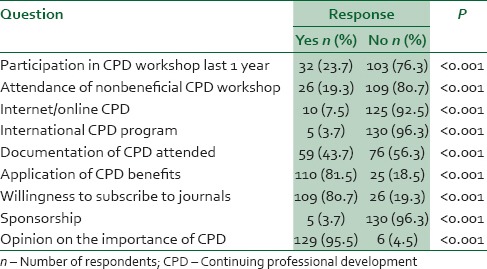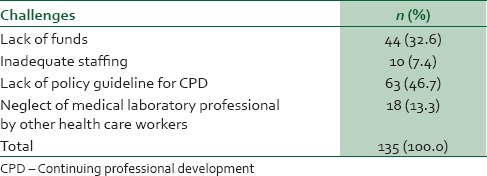Abstract
Background:
Continuing professional development (CPD) in Medical Laboratory Scientists (MLS) is aimed at equipping laboratory professionals with the necessary skills to enhance practice. The laboratory scientists are usually the first contact between the patient and health care system in aspects of diagnosis and monitory of diseases. As such, it becomes imperative to assess the knowledge of laboratory personnel regarding CPD.
Materials and Methods:
Self-administered questionnaires were distributed to 200 laboratory personnel's attending the maiden CPD workshop organized by the Association of MLS in Jos the Plateau state capital.
Results:
One hundred and thirty-five (82 males and 53 females) of the 200 administered questionnaires were returned. Only 32 of them (23.7%) attended CPD program in the last 1 year with 10 (7.5%) engaging in online CPD. Five (3.7%) of the respondents had the privilege to attend an international CPD. Majority (95.2%) of the respondents identified CPD as an essential component of professional career development. Lack of sponsorship was identified as a major setback in CPD efficiency by 93.8% of respondents. About 58 (46.4%) noted that poor attendance in CPD workshops was due to unavailability of policy guideline for CPD. One hundred and twenty (95.2%) of respondents had an aim of improving their skills after attending CPD workshops.
Conclusion:
The overall attitude of Nigerian MLS toward attending CPD workshop is poor; however, the knowledge regarding the importance of CPD is adequate. There exists a gap between sponsorship for CPD by various institutions and MLS.
Keywords: Continuing professional development, Federal Ministry of Health, Medical Laboratory Scientists Association of Medical Laboratory Scientists of Nigeria, Medical Laboratory Scientists Council of Nigeria
INTRODUCTION
Continuing professional development (CPD) or continuing professional education is a process by which professionals retain and improve skills and competence in their daily work. According to the free Wikipedia encyclopedia; CPD could be defined as an organized learning process geared toward ensuring competence to practice, acquisition of knowledge, and hands on experience.1
Various scientists have pointed out that CPD usually ramifies into all aspects of our professional lives and the end result is a wide range of unexpected benefits.2 One of the benefits according to Revans 3 is enrichment and development of different organizations and establishments. Revans stressed that “if an organization does not learn faster than the rate of change in their environment, theydie.”
Medical Laboratory Scientists (MLS) are at the forefront of hospital diagnostics, preventive and public health services as well as in research and academics, therefore they cannot be left out in this positive drive toward achieving excellent practices. Africa is currently saddened with the largest and overwhelming burden of HIV, Tuberculosis, Malaria, and other diseases which are usually diagnosed in medical laboratories. It is, therefore, important that laboratory staffs are current and well-skilled to handle diagnosis and monitoring of these diseases.4
In 2012, the MLS Council of Nigeria (MLSCN) in conjunction with the Federal Ministry of Health (FMOH) drew up a policy for CPD program for MLS. The policy had a singular vision of ensuring that all laboratory staff reaches beyond their formal education to the maintenance and continuation of necessary knowledge, skills, and abilities so as to deliver high-quality laboratory services.5
The United Nations John Hopkins University announced its plans to develop for Nigeria a web-based CPD program to provide an opportunity for MLS in the country. To achieve these, the institution would be collaborating with MLSCN and the Association of MLS of Nigeria (AMLSN).6
With so much attention drawn toward the provision of quality laboratory services, this work was therefore aimed at evaluating the level of awareness/knowledge and attitude of MLS regarding CPD and possibly identifying challenges encountered in attending CPD sessions.
MATERIALS AND METHODS
This was a cross-sectional questionnaires survey of MLS and other laboratory staff attending a CPD workshop in Plateau State. This CPD, which was organized by the AMLSN Jos branch happens to be the first of its kind (maiden) in Plateau State, Nigeria. Self-administered questionnaires were distributed to participants attending the workshop held between the 28th and 29th April 2013 at the Aids Prevention Initiative in Nigeria auditorium. The questionnaires in addition to obtaining demographic information also sought to assess the level of awareness and challenges in attending CPD workshops. Informed consents were obtained before administering the questionnaires. Data generated from the questionnaires were analyzed using SPSS 15 software (IBM Licensing - Congos, TMI). Significant level was set at P ≤0.005 using the student's t-test.
RESULTS
Of the 200 questionnaires administered during the CPD workshop, only 135 were completely filled and returned giving a response rate of 67.5%. The male respondents were 82 (60.7%) with mean age 40.11 ± 6.39 years and females were 53 (39.3%) with a mean age of 35.48 ± 5.79 years as shown in Table 1.
Table 1.
Distribution of subjects based on age and sex

Thirty-two (23.7%) had the opportunity to attend CPD program in the last 1 year while 10 (7.5%) engaged in online CPD. Five (3.7%) of the respondent had the privilege to attend an international CPD and majority (95.2%) of the respondents were of the opinion that CPD is an essential component of professional career development. Of note is the lack of sponsorship for majority of the CPD (93.8%) program attended by participants [Table 2].
Table 2.
Awareness of CPD among Medical Laboratory Scientists

Only 9 (7.2%) of the respondents were of the opinion that inadequate staffing was responsible for poor attendance for CPD program. Fifty-eight (46.4%) of the respondents encountered challenges in the area of unavailability of policy guideline for CPD implementation while 41 (32.6%) suggested that lack of funds was a major setback in organizing CPD workshops in our environment [Table 3].
Table 3.
Challenges encountered in attending CPD by Medical Laboratory Scientists

Table 4 shows the reasons for attending CPD workshops by respondents; majority of the respondents (89%) who attended had a singular aim of improving their knowledge and skills while 12 (9.0%) attended in order to facilitate license renewal. On the other hand, 2 (1.5%) were attending so as to interact and exchange news with friends and colleagues.
Table 4.
Reasons for participation in CPD program

DISCUSSION
The findings of our survey with low attendance in CPD are different in other European countries where CPD workshops are compulsory for most professionals. This disparity in CPD attendance maybe due to the Medical Practitioners Act 2007, which is geared toward radical reformation of medical profession in Ireland.7 The evidence of willingness to apply benefits obtained at CPD is in agreement with a survey conducted in the United Kingdom (UK) where acute trust consultants reported that >80% were ready to apply knowledge and skills acquired at CPD workshops. This same study also showed that 86% of the CPD participants in an advanced pediatric life support workshop had put the skill they learnt into practice.8 Currently, there are no data to determine application of CPD knowledge and hence, more work will need to be done in our environment to ascertain the level of application of CPD benefits since the earlier report was from the UK. In addition, some respondents from the UK survey believed that CPD affords the opportunity to also improve on external quality control assessment. This will ensure consistency across professional groups and possibly identify poor performance.
The main barrier encountered by respondents was a lack of funding and policy (existing laws for training and retraining of staff members in an organization) for CPD by most organizations. This was also the findings in Capitta Business Studies where majority of health workers who participated in CPD had challenge with sponsorship from their frequence.9 They also noted that such organization took little interests in the training needs of the health workers employed to serve in their organization. In a study conducted among nurses in Australia on a professional portfolio as part of their annual registration, they stressed that organizational support positively influences attitudes of nurses toward participation in CPD.10
Our work suggests that the lack of CPD policy mentioned by the respondents as a challenge to CPD attendance may be due to poor updating of knowledge on the part of the MLS since a policy to that effect was drawn in 2012.5 In addition, the policy was drawn by the MLSCN in collaboration with FMOH and is similar to the policy for professional training for doctors in the UK.11 Our work has revealed that most organizations do not have the approved guideline for CPD for MLS, which was approved 2 years ago. This unavailability may be due to the fact that it is a new policy and this may take some time for effective circulation to the organizations involved laboratory services in Nigeria.
CONCLUSION
CPD workshop and sponsorship for MLS in our environment is uncommon. There is a need for all organizations employing the services of MLS to raise awareness and support for more involvement in CPD programs as this will improve services rendered. Finally, the MLSCN should be more proactive in the circulation of current updates to various organizations under her custody so as to create more awareness.
Limitation
Few MLS were present at the CPD workshop, so this may not be a fair representation of level of awareness for CPD by MLS. In addition, few literatures were available for this study since much work has not been done in our environment.
Financial support and sponsorship
Nil.
Conflicts of interest
There are no conflicts of interest.
REFERENCES
- 1.Wikipedia: Continuing Professional Development (CPD): The Free Encyclopedia. [Last accessed on 2013 Aug 09]. Available from: En-wikipedia.org/wiki/CPD .
- 2.David M. Continuing Professional Development. Access Online Tutor Support. [Last accessed on 2013 Aug 10]. Available from: http://www.nwlink.com/clanclark .
- 3.Revans R. ABC of Action Learning. Lemons and Crane. 1998. [Last accessed on 2015 Nov 20]. Available from: www.gowerpublishing.com .
- 4.Association of Medical Laboratory Scientists of Nigeria. [Last accessed on 2013 Aug 10]. Available from: http://www.amlsn.org .
- 5.CPD Policy. Medical Laboratory Council of Nigeria. 2012. [Last accessed on 2013 Aug 11]. Available from: http://www.mlscn.gov/pg1 .
- 6.Friday O. Punch Newspaper John Hopkins Varsity, USAID to Develop Program for Laboratory Scientists, 2012. Abuja: Friday Olokor; 2012. Jan 11, [Google Scholar]
- 7.Gary C. Medical Practitioner Act Update, Irish Medical Times. [Last accessed on 2011 Jun 17]. Available from: http://www.imt.practitioner-acts-update.html .
- 8.Nigel M, Caroline M, Amanda H. A Study to Assess the Impact of CPD on Doctor's Performance and Patients/Service Outcomes for CMC. In Academic Unit of Primary Medical Care University of Sheffield. 2012:12–4. [Google Scholar]
- 9.Nigel M, Caroline M, Amanda H. A Study to Assess the Impact of CPD on Doctor's Performance and Patients/Service Outcomes for CMC. In Academic Unit of Primary Medical Care University of Sheffield. 2012:42. [Google Scholar]
- 10.Katsikitis M, McAllister M, Sharman R, Raith L, Faithfull-Byrne A, Priaulx R. Continuing professional development in nursing in Australia: Current awareness, practice and future directions. Contemp Nurse. 2013;45:33–45. doi: 10.5172/conu.2013.45.1.33. [DOI] [PubMed] [Google Scholar]
- 11.Morrison J. Clinical review, ABC of learning and teaching in medicine. Evaluation. Br Med J. 2003;15326:326–85. doi: 10.1136/bmj.326.7385.385. [DOI] [PMC free article] [PubMed] [Google Scholar]


